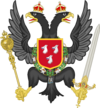Saubrème
This article is incomplete because it is pending further input from participants, or it is a work-in-progress by one author. Please comment on this article's talk page to share your input, comments and questions. Note: To contribute to this article, you may need to seek help from the author(s) of this page. |
Saubrème Free State | |
|---|---|
|
| |
| Motto: | |
| Capital and largest city | Frederiksburg |
| Atmoran control | 1657 |
| Self-government | 13 May 1956 |
| Government | Parliamentary republic |
| Lucille-Marie Argenis | |
| Amaurys Rumph | |
| Legislature | States-Assembly of Saubrème |
| Senate | |
| House of Representatives | |
| Parliament of Atmora | |
| 2 of 214 | |
| 2 of 548 | |
| Area | |
• Total | 62,874 km2 (24,276 sq mi) |
| Population | |
• 2015 census | 1,378,673 |
• Density | 21.92/km2 (56.8/sq mi) |
| GDP (nominal) | 2015 estimate |
• Total | ƒ13.371 billion |
• Per capita | ƒ9,698.63 |
| Gini (2015) | medium |
| HDI (2015) | medium · 19th |
| Currency | Atmoran Antillean guilder ((ANGƒ)) |
| Date format | dd/mm/yyyy |
| Driving side | right |
| Website | www |
The Saubrème Free State (Dutch: Saubrème Vrijstaat; Papiamento: Frèistaat Saubrème) is a federal state of the Atmoran Confederation in the Lucayan Sea within the Antilles archipelago neighbouring with the Aellyrian Antilles.
History
Prehistory
Arrival of the Aellyrians
Arrival of the Atmorans
The Atmoran states interests in the Antilles followed Aellyric invasions of Atmora in the 15th century, following centuries of piracy and slavers from Aellyria. The States-Assembly of Atmora gave a charter to the Atmoran East Anemoisic Trading Company (OHC) in 1632. The charter provided for the establishment of colonies and plantations in the Antilles along with in charge with engaging in the spice trade with Eshnava and Aellyria. By 1635 the OHC established the first Atmoran colony on Sint Clemens Island along with the town of Frederiksburg. Following the dissolution of the Atmoran States in 1663, the colonies were taken over by Gallia, Larsenburg, and Lieseltania. Within the Lieseltanian colonies in the Antilles, the colonial government would heavily use Vozhan labourers. Many of the Vozhan colonists would settle the Antilles to escape Lieseltanian religious and ethnic prosecution.
Early Atmoran colonies in the Antilles, would be marked with piracy and frequent raids by Aellyrian pirates, the Atmoran states would form the Atmoran East Anemoisic Squadron by the late 17th century to combat Aellyrian piracy. In July 1653, in the First Lucayan War the Kingdoms of Gallia, Larsenburg, and Lieseltania led an anti-piracy campaign against the Aellyrian Lords of the Antilles would see Atmoran control over the Greater Antilles islands solidified with the Treaty of Soesdyke in 1657.
18th century
19th century
Geography
Climate
Flora and Fauna
Environmental Issues
Government and politics
Law
Military
Defence of the islands is maintained by Atmora. Due to the Atmoran Antilles serving as the strategic centre for the Atmoran Forces Antilles in the Anemoisic Ocean.
Atmora maintains the Regiment Antilliaanse Carabiniers the main army garrison composing of full-time and part-time reserve force. The main base for the Royal Atmoran Navy at the Antilles is the Kwartier Marinebasis Carénage on Aulinagan Island composing of a squadron of patrol vessels, additionally the Atmoran Coast Guard maintains a squadron at Carénage.




